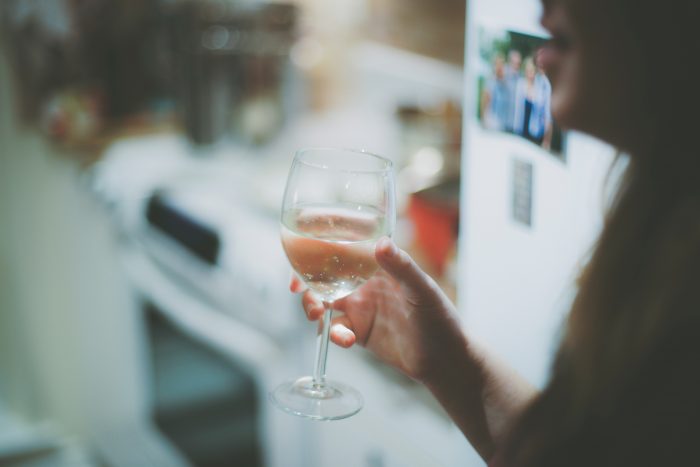It took me a long time to admit I had a drinking problem.
Like many addicts, I always felt things like addiction were something that happened to other people—not people like me.
I didn’t drink during the day. I’m always keen to mention that, although I know logically, it makes no difference—I still drank at least two bottles of wine every night, without fail. By myself. At home.
The fact that I didn’t drink during the day kept me going for a long time. It was the thing that made me feel like I wasn’t an alcoholic. I persuaded myself that alcoholics were those who had hit rock bottom. They were the kind of people who lost their jobs and spent their days on a park bench drinking from a paper bag.
The fact that I held down my job, kept the house clean, and had happy kids meant I was alright, didn’t it? If I didn’t need to drink in the day, I told myself I was okay—I couldn’t see a life without wine. I couldn’t see where the fun, relaxation, good times, and all the rest of it would be. More to the point, I didn’t understand how other people managed without drinking.
Of course, in reality, no one can maintain drinking the amount I did for a long time. The stress and strain it put on my body made me realize that I am lucky. I am lucky to be here. I am lucky to have a fairly strong, healthy body, and I am grateful that my family stood by me.
I’m working on my peace of mind. It’s certainly a huge amount better than it was when I was drinking, but the amount I drank was going to affect my mental health. I had my head in the sand when I thought I would get away from it without any scars.
Life goes on, and eventually, I began to find new things that take my time, and occupy the busyness in my head. Those hard days, in the beginning, were more difficult than anything else I’ve faced. I decided not to focus on the end, but rather on each moment. If I could do one, then maybe I could do the next. Gradually they built up, and I felt I was achieving something.
It wasn’t easy. Even now, when I see posts and comments from people saying how much better their anxiety is a week after they stop drinking, I find it slightly unbelievable. Honestly, it also makes me feel a little jealous because I wasn’t affected like that. In reality, it took me a good three years to really start to feel myself again.
In the end, I had to see my doctor and was prescribed an anti-anxiety medication, which helped me get a better handle on my thoughts. I know we are all affected differently, and I can only think that my drinking was so excessive for such a long time that it affected my already poor mental health permanently.
Now, everything is much clearer. I don’t need a substance to help me relax. I don’t need anything to help me have fun. I can have fun without having a hangover or forgetting anything. Being alcohol-free gives you a lot of freedom. But, it is a harder road than I thought it would be. If I’d known how long it would take me, it would have scared me, but looking back, I wouldn’t change it.
I had to reach my rock bottom to be able to climb back up again. I’d tried before, but until I hit bottom, nothing was quite enough to force me to do the climb. It was easier not to and to stay where I was. But the longer I did, the harder it was to get out, and the more I came to rely on wine physically and mentally. Through this, I began to hate the thing I loved.
I have worked hard to get to where I am now, but it was a worthwhile challenge—life without wine is so much better. While my perspective on wine has changed, it doesn’t mean it has changed for other people.
Although sometimes, I am surprised by the lack of understanding from some when it comes to talking about drinking. I guess that is one of the things I find hardest. I don’t expect everyone to change to suit me, but it would be nice to feel supported.
Unfortunately, not everyone will understand quite how hard it is to face your addiction and try to overcome it. Instead, people joke about it and share posts on social media where someone has a specially fitted glass that allows them to drink from the bottle instead of refilling a cup. They joke that after the lockdown, they will need a dietician and AA meetings. While my drinking problem is not their problem, I find it hard to see those close to me joke like that. It hurts my feelings, to be honest.
I think for me, that’s why online support has always been so good. It doesn’t matter where you are, or who you are. There is always someone online if you find the right group. There is always someone who has been there, someone who understands. That doesn’t mean that we are all the same, just that through our shared experiences we can understand and provide support for each other.
For me, what worked was that no one knows you—they only know what you tell them. Likewise, others may be more honest with you because you don’t know them. The anonymity allows for a unique kind of honesty. You can create your own story, which frees you from shame. It doesn’t matter where you live, and you don’t have to go out.
There’s no timetable to keep to, and so there is often someone there when you want to talk, even if they are on the other side of the world. Recently many traditional meetings haven’t been able to run due to the coronavirus lockdown. This means a lot of people are unable to be in regular contact with their normal support networks. While it might not be the same, meeting online at least provides some form of support, camaraderie, and understanding for those feeling isolated.
For someone who was lost for a long time without drinking, something that helped me gain some self-confidence back was the reversing of roles. In the early days, I was the one struggling and unsure, asking for advice. As time went on, I became more and more able to give advice as well as receive it. There is something wonderful about being able to give something back, even if it is only your time. Knowing that your experience might help someone else get through a dark patch and come out on the other side makes your tough times feel a little more worthwhile.
Personally, I think connection is a really valuable tool in overcoming addiction of any kind. So connect with those who raise you up. And remember that not everyone will get what we are experiencing, but there are a lot of people out there who do.









Read 7 comments and reply